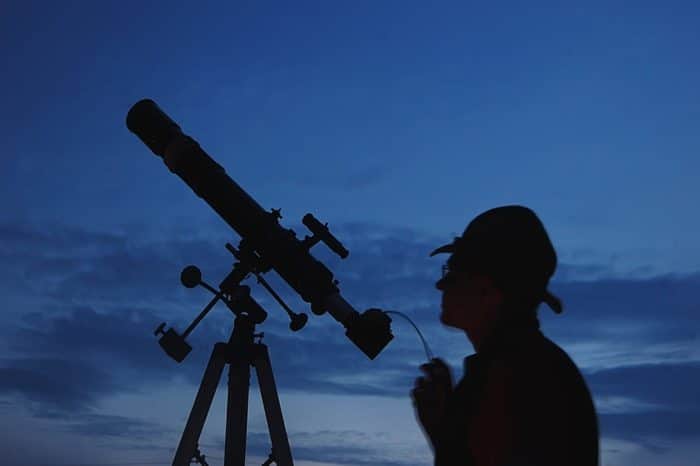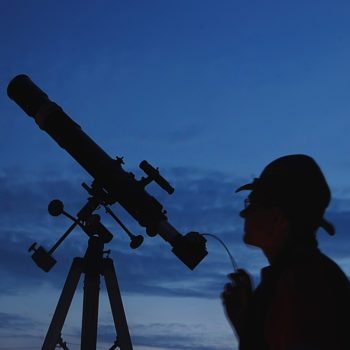Why We Love It
-
$110,220Potential Avg. Salary
-
InvestigativeCareer Attribute
-
Skill-Based WorkCareer Attribute
Astronomers are scientists that focus their research on studying the universe. They use telescopes and satellites to observe objects in space, identify distant stars and planets, form conjectures on the physics of other planets, and monitor the movement of objects in space to detect threats to earth or satellites.
Recommended Schools
What is an Astronomer?
The following job responsibilities are common for individuals in astronomer roles:
- Operate high-powered telescopes to observe objects in the Milky Way galaxy
- Use satellite imagery to identify distant stars, planets, and solar systems
- Form conjectures on the physics of other planets, stars, and solar systems
- Monitor the movement of objects in space to detect threats to earth or deployed satellites
- Formulate theories on the causes and effects of outer space phenomenon like black holes or neutron stars
A Day in the Life
Astronomers are scientists that focus their research on the solar system, allowing them to form theories and make observations about our own world and solar system, as well as neighboring planets and galaxies. They use high-powered tools like telescopes and satellites to observe the workings of stars, planets, solar systems, and galaxies. This allows astronomers to formulate new maps of the universe, observe phenomenon like black holes and neutron stars, and form conjectures on the physics of other stars, planets, and solar systems.
While much of the work of an astronomer is focused on forming a better understanding of the universe, astronomers also conduct practical observation. They monitor space for moving objects that threaten earth or deployed satellites, and recommend precautionary measures to avoid impact when required. They assist with planning space missions for organizations like NASA. Some astronomers also work with engineers, providing guidance and insight to help create more powerful telescopes and observation instruments.
Astronomers generally fall into one of two classifications: observational astronomers or theoretical astronomers. Observational astronomers observe stars, planets, and solar systems that can be viewed using a telescope or satellite, and theoretical astronomers use the work of observational astronomers to form theories about the parts of space that cannot be viewed. Many astronomers also teach college astronomy classes in addition to conducting observation and research activities.
Typical Work Schedule
Most astronomers work full-time schedules during normal business hours. However, they may need to work at night on occasion in order to observe space when it’s not obscured by radiation from the sun, or they may teach evening astronomy classes for colleges.
Astronomer Specializations
- Observational astronomers use telescopes and satellite imagery to observe planets, stars, and solar systems that can be viewed using these devices.
- Theoretical astronomers use observations of visible space to form conjectures about areas of the universe that aren’t visible using modern astrology equipment.
- Astronomy professors teach the concepts of astronomy to college students at both graduate and undergraduate levels.
Typical Employers
Most astronomers are employed by scientific research and development companies, colleges and universities, or the federal government for agencies like NASA.
Recommended Schools
How To Become an Astronomer
A graduate degree is required for all astronomer positions, though some positions require a master’s degree and some require a Ph.D. The level of degree you earn will depend on the types of roles you want to pursue. Regardless of how much education you need, the first step will be to earn a bachelor’s degree. A bachelor’s degree will be required before you can earn a graduate degree; common degrees pursued include physics or astronomy. Both degrees offer relevant education for graduate programs.
After earning a bachelor’s degree, you’ll want to gain experience in the field as well as pursue a master’s degree. With a bachelor’s degree, you’ll qualify for roles as an assistant at an observatory, or as a technician or assistant in a research facility. While earning professional experience, you’ll want to pursue a master’s degree in astronomy, and possibly choose a degree with a focus on the career field you’re interested in. Many astronomer positions in scientific research and development only require a master’s degree.
However, if you want to work in academia and teach college astronomy courses, you’ll need to go on to earn a Ph.D. in astronomy. Most colleges and universities require astronomy professors to hold a Ph.D. Additionally, while earning your master’s and Ph.D. degrees, you’ll want to gain professional teaching experience. This can be achieved by working in adjunct instructor positions, or through a graduate teaching assistantship that allows you to teach classes in exchange for paid tuition and a stipend.
Astronomer Salary Data
We’ve provided you the following to learn more about this career. The salary and growth data on this page comes from recently published Bureau of Labor Statistics data while the recommendations and editorial content are based on our research.
National Anual Salary
Low Range
$68,680Average
$110,220High Range
$166,320National Hourly Wage
Low Range
$33/hrAverage
$53/hrHigh Range
$80/hrHow do Astronomer salaries stack up to other jobs across the country? Based on the latest jobs data nationwide, Astronomer's can make an average annual salary of $110,220, or $53 per hour. On the lower end, they can make $68,680 or $33 per hour, perhaps when just starting out or based on the state you live in.
Salary Rankings And Facts
#47 Nationally for All Careers
Above Average Salary Nationally
Programs and Degrees
Here are the most common degrees for becoming an Astronomer. a is usually recommended and specifically a degree or coursework that prepares you for the particular field, see below.
Highest Education Among Astronomers
- 56.3% Doctorate
- 16% Masters
- 22.2% Bachelors
- 2.2% Associates
- 3% College
- 0.1% High School
- 0.4% Less than High School
Job Growth Projections and Forecast
2014 Total Jobs
1,9002024 Est. Jobs
1,900Job Growth Rate
---Est. New Jobs
---How does Astronomer job growth stack up to other jobs across the country? By 2024, there will be a change of --- jobs for a total of 1,900 people employed in the career nationwide. This is a --- change in growth over the next ten years, giving the career a growth rate nationwide of Above Average.
Growth Rankings And Facts
#594 Nationally for All Careers
Above Avg. Growth Nationally
What Companies Employ The Most Astronomers
| Industry | Current Jobs | New Jobs Needed | % Increase |
|---|---|---|---|
| Research and development in the physical, engineering, and life sciences | 600 | --- | --- |
| Colleges, universities, and professional schools; state | 500 | --- | --- |
| Federal government, excluding postal service | 500 | -100 | --- |














